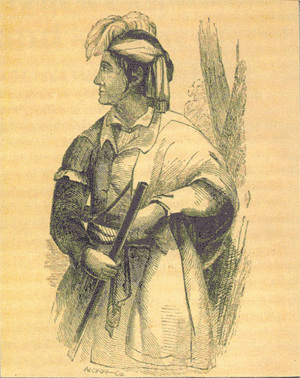
Wild Cat, also known as Coacoochee or Cowacoochee (from Creek Kowakkuce "bobcat, wildcat"[1]) (c. 1807/1810–1857) was a leading Seminole chieftain during the later stages of the Second Seminole War and the nephew of Micanopy.
Background
Wild Cat's exact year and place of birth is not agreed upon. Many local scholars believe he was born in 1807 on an island in big Lake Tohopekaliga, south of present-day Orlando.[2][3][4] Some scholars say Wild Cat was born around 1810 to King Philip (or Ee-mat-la) and his wife in Yulaka, a Seminole village along the St. Johns River in northern Florida. Still others suggest that he was born near present-day Apopka, Florida.[5] Wild Cat may have had a twin sister who died at birth. As a twin, he was regarded by the tribe as being particularly gifted.
Gibson]] in Oklahoma's Indian Territory, along with his remaining two hundred followers. Growing depressed over his forced surrender, he was said to have stated, "I was in hopes I would be killed in battle, but a bullet never reached me."[6]
Traveling to Washington, D.C. in 1843 with Alligator as part of a Seminole delegation, Wild Cat failed to gain financial aid for the Seminole. The tribe had suffered a series of floods on their reservation, as well as slave raids by neighboring Creek. (The latter captured free blacks and Indians and sold them to southern slave holders, although Indian slavery had long been prohibited). This devastated the black and Indian Seminole. Conditions continued to worsen until 1849.
That year Wild Cat left the reservation with about one hundred followers, consisting of Seminole and Black Seminole, who included some refugee slaves, and escaped to Texas. Joined by about one thousand Kickapoo, Wild Cat's band eventually established a new community in Mexico. The government awarded the tribe an area of land in recognition for their service against Apache and Comanche raiders. Earning a commission as Colonel in the Mexican army, Wild Cat would live with the Seminole in Alto, Mexico until his death of smallpox in 1857. His son Gato Chiquito (in Spanish), or Young Wild Cat, was chosen as chief.
Legacy
On May 29, 2012 an application was registered at the US Bureau of Geographic Names to name a stretch of unnamed barrier islands on the Florida East Coast for this chief.
Quotes
- "I speak for myself, for I am free. Each of the others also speak for themselves. We are a choir of voices that will drown out your lies."
References
- Johansen, Bruce E. and Donald A. Grinde, Jr. The Encyclopedia of Native American Biography, New York: Henry Holt and Company, 1997.
- ↑ Martin, Jack B.; Mauldin, Margaret McKane (2000). A Dictionary of Creek Muskogee. U of Nebraska Press. pp. 65. ISBN 0803232071.
- ↑ Dickinson, Joy Wallace (2003). Orlando : city of dreams. Charleston, SC: Arcadia Pub. p. 17. ISBN 0-7385-2442-5.
- ↑ Robison, Jim (1 April 2001). "Wildcat's Roar -- 'Hooah!'". Orlando Sentinel. Retrieved 5 June 2011.
- ↑ Robinson, Jim (4 April 1993). "Coacoochee Earned Reputation As Chief". Orlando Sentinel. Retrieved 5 June 2011.
- ↑ "Apopkamuseum.org".
- ↑ Brown, Virginia P.; Owens, Laurella (2011). The World of the Southern Indians. NewSouth Books. p. 123. ISBN 9781588382528.